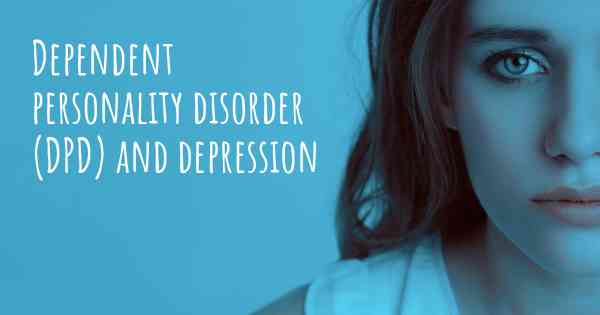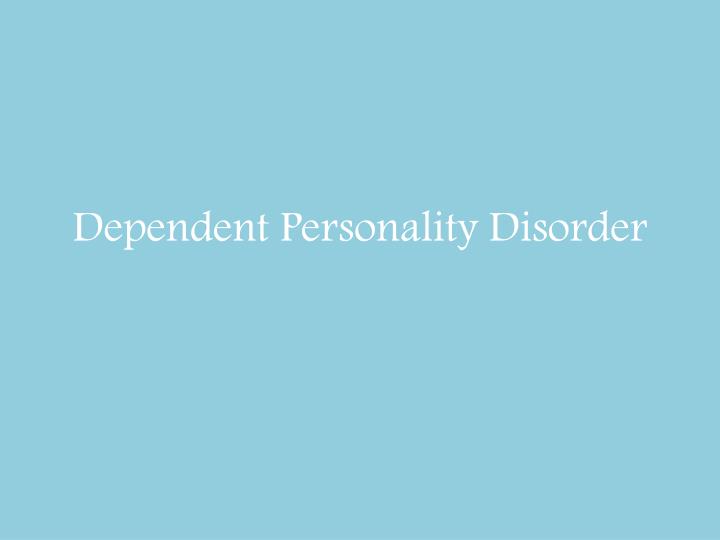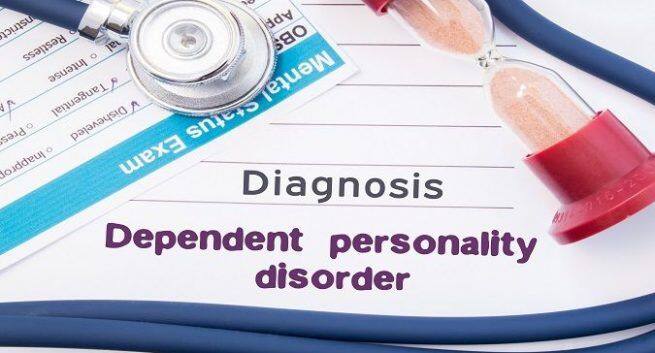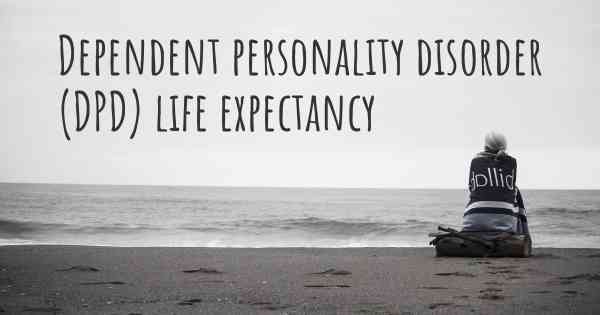Personality disorders are a unique category in the world of mental illness. People with borderline personality disorder struggle to understand how wives, husbands, friends, and other family members experience their intense reactions, mood swings, and risky behavior. People with borderline personality disorder tend to have major difficulties with relationships, especially with those closest to them. Their wild mood swings, angry outbursts, chronic abandonment fears, and impulsive and irrational behaviors can leave loved ones feeling helpless, abused, and off balance. Partners and family members of people with BPD often describe the relationship as an emotional roller coaster with no end in sight. You may feel like you're at the mercy of your loved one's BPD symptoms—trapped unless you leave the relationship or the person takes steps to get treatment.
The goal of therapy is to help the person with DPD become more active and independent, and to learn to form healthy relationships. Short-term therapy with specific goals is preferred when the focus is on managing behaviors that interfere with functioning. The goal of therapy is to help the person with DPD become more active and independent, and to learn to form healthyrelationships. Rose Hill Center offers comprehensive treatment for a variety of personality disorders, including dependent personality disorder. Evidence-based treatment for the condition includes psychotherapy, cognitive-behavioral therapy, or some medication therapy. The treatment focuses on alleviating the disorder's symptoms and helping the individual learn to make independent life choices and decisions.
The staff at our mental health treatment center understand how difficult these symptoms, both struggling with them and overcoming them, can be. Away from these things, clients can break destructive habits and learn new, healthy ones that will allow them to practice making independent decisions and build their self-confidence. Used as treatment for people with dependent personality disorder. Cognitive-behavioral therapy focuses on patterns of maladaptive thinking and seeks to eliminate them.
Often people in cognitive-behavioral therapy set goals that they eventually try to achieve without relying on others. Often the patient is receptive to the treatment and seeks help with their personal relationships. With this particular kind of therapy, the therapist will help the patient understand how they interact with others and how this contributes to their dependency issues. This particular therapies purpose is to show the patient that their dependency comes with a high price and that they do have alternatives.
Another type of therapy used to treat dependent personality disorder is group therapy. Often people taking part in group therapy must be highly motivated to see improvement. Studies show that time-limited assertiveness-training groups with very clear goals are successful. It has also been said that family or martial therapy can improve a person's independence by working on the families relationship as a whole. While psychotherapy can be very challenging for people with DPD, compassionate therapists will help them progress gradually through this healing path. Psychodynamic therapy helps to shine a bright light on what the client is really experiencing and what they've been denying for so long.
One of the major stumbling blocks is a lack of awareness—both for the person living with dependent personality disorder and for the people in that person's life and relationships. By definition, DPD is not a disorder that exists in a vacuum. Hence, as a family member, partner, or friend, your support is critical in your loved one's journey toward recovery.
A personality disorder can affect how you cope with life, manage relationships, and feel emotionally. You may find that your beliefs and ways of dealing with day-to-day life are different from others and that you find it difficult to change them. You may find your emotions confusing, tiring, and hard to control. Because it is distressing, you may find that you develop other mental health problems like depression or anxiety. You may also do other things such as drink heavily, use drugs, or self-harm to cope.
Certain types of psychotherapy are effective for treating personality disorders. During psychotherapy, an individual can gain insight and knowledge about the disorder and what is contributing to symptoms, and can talk about thoughts, feelings and behaviors. The type of treatment will depend on the specific personality disorder, how severe it is, and the individual's circumstances.
Because a family member with BPD may not be able to provide the empathy and self-awareness necessary for a relationship, it's vital to have other supports in your life. Carve out time to spend with friends and engage in leisure activities. If you need to talk about the experience of living with someone with a mental illness, support groups, mental health professionals, religious leaders, and your doctor can be excellent resources. You also should consider how to involve other family members in the care and support of someone with BPD.
No single person should be responsible for communicating calmly and responding to crisis situations. The more people who know effective strategies for responding to the individual, the less often crises will erupt. Both dependent personality disorder and BPD are characterized by fear of abandonment. In dependent personality, the individual also urgently seeks a replacement relationship to provide caregiving and support.
BPD can further be distinguished from dependent personality disorder by a chronic pattern of intense and unstable relationships. Dependent personality disorder is a mental health issue where sufferers exhibit an excessive need to be taken care of, resulting in needy and submissive behaviour. It is categorised as a Cluster C personality disorder, which also houses avoidant personality disorder and obsessive compulsive disorder. Cluster C personality disorders all exhibit heightened levels of anxiety; in the case of someone with dependent personality disorder, feeling alone and being helpless are the main sources. Compared to other mental illnesses, dependent personality disorder isn't very common.
It is only diagnosed in 0.5 to 0.6 percent of the general population. However, signs of this personality disorder can appear in virtually anyone. You may experience some symptoms of DPD throughout your life, even if you don't have this mental health condition.
The TARA for Borderline Personality Disorder's mission is to foster education and research in the field of personality disorders, like borderline personality disorder. The primary treatment method for all personality disorders, DPD included, is psychotherapy .Cognitive Behavioral Therapy is commonly recommended. Additional options include Psychodynamic psychotherapy and group therapy. The main goal of this therapy is to make the individual more independent and help them form healthy relationships with the people around them.
It's estimated that around 2.5% of the U.S. population has DPD, although other estimates say it's much higher. Some people with personality disorders have trouble coping with stressful events, and may need support in a crisis. They may develop suicidal thoughts and behaviours and require emergency assistance. Rarely, hospitalisation may be required in severe cases to prevent the risk of self-harm or suicide, or for the treatment of other mental health conditions. This is a temporary solution to ensure safety and, in general, long-term hospital admission is not recommended for people with personality disorders. Psychotherapy is the most effective long-term treatment option for personality disorders.
Psychotherapy is when a psychologist, psychiatrist or psychotherapist helps people to understand their thoughts, motivations and feelings. These insights can help people to manage their symptoms, develop satisfying relationships and make positive behaviour changes. It is thought that personality disorders may occur due to a complex interaction between negative early life experiences and genetic factors. Disruptions to the attachment between parents and infants can happen due to mental or physical illness or substance abuse in the parent, or long separations between parents and infants.
A lack of positive caregiving in early childhood can also have a negative impact on personality development. Drugs and alcohol might interfere with DPD treatment due to that therapy focuses on addressing the underlying mental health disorders, like anxiety and depression. If a person with DPD is taking antidepressant or anti-anxiety medication, alcohol use can be risky because it is a depressant affecting the central nervous system.
Prescription drugs usually act slower than illicit substances and could take several weeks before the person begins to feel the wanted relief. In this case, the individual may take more of the drug to experience the intended relief. Abuse of the drug then becomes a problem that needs to be addressed.
DPD is a personality disorder characterized by a pervasive and excessive need to be taken care of. Other disorders included in Cluster C are avoidant and obsessive-compulsive personality disorders; all three show high levels of anxiety. Common symptoms of dependent personality disorder include things like extreme sensitivity to criticism, fear of abandonment or separation, and a sense of helplessness when a relationship ends. Everyone experiences some level of discomfort at the end of a relationship. For example, you might feel unable to make everyday decisions, and you may need constant support or approval from others. Personality disorders tend to be chronic and often require long-term treatment.
When the symptoms are severe or other physical or mental conditions are present, hospitalization inside a personality disorder facility could be required to treat the disorder. Residential or inpatient treatment centers can offer acute or long-term treatment program, depending on the type and severity of the personality disorder of the patient. Other forms of CBT are also considered helpful in treating personality disorders. For example, dialectical behavior therapy is indicated for the treatment of borderline personality disorder, a disorder where suicidal thoughts and self-mutilation actions are common.
During a DBT session, the therapist assures the patient that their behavior and actions are understandable and valid. By the end of the therapy, the patient should be able to change disruptive or unhealthy behavior. Instead, they continue the behavior and may get caught up in abusive relationships. Even better, you'll be able to do it right from the comfort of your own home so you can start working toward your future, sooner than ever. People often develop the early signs of a personality disorder in adolescence.
The exact number of Australians with personality disorders is not known. People with a personality disorder also have high rates of coexisting mental health conditions such as depression and substance abuse. Borderline personality disorder often occurs with other mental illnesses. These two mental health conditions are common with people with DPD. It is essential to not self-medicate with prescription opioids, alcohol, or other drugs, like marijuana. As is the case with many personality disorders, people with DPD generally do not seek treatment for the disorder itself.
Rather, they might seek treatment when a problem in their lives -- often resulting from thinking or behavior related to the disorder -- becomes overwhelming, and they are no longer able to cope. People with DPD are prone to developingdepression or anxiety, symptoms that might prompt the individual to seek help. This is especially prevalent for those individuals who also experience high interpersonal stress and poor social support. Recognizing the signs and symptoms of borderline personality disorder is not always easy.
BPD is rarely diagnosed on its own, but often in conjunction with co-occurring disorders such as depression, bipolar disorder, anxiety, an eating disorder, or substance abuse. Your family member or loved one with BPD may be extremely sensitive, so small things can often trigger intense reactions. Our highly experienced and knowledgeable clinicians are familiar with the unique challenges that treating dependent personality disorder can present. As such, our clinicians are highly conscientious in all client interactions, ensuring that the client-therapist relationship does not become dependent. One of the most common personality disorders, dependent personality disorder usually manifests itself in early adulthood.
The disorder heavily impacts the formation and maintenance of interpersonal relationships. Those with DPD have extremely low self-esteem, an intense fear of being abandoned and noticeable helplessness. For some with DPD, this dependence is so deeply ingrained that they may enter into—and remain in—damaging or abusive relationships because the fear of confrontation or abandonment runs so deep. The caring staff at the Rose Hill Center understands the symptoms of dependent personality disorder and how it may affect you or your loved one daily. There are evidence-based treatments available to help individuals live an improved lifestyle, where they can rely on themselves rather than other people for everyday decisions.
Behavioral, and cognitive, seems to be most effective for treating dependent personality disorder. In therapy, people can learn coping skills and challenge irrational thoughts and uncomfortable emotions that contribute to dependent behaviors. They may also learn to identify triggers and explore childhood experiences, such as their relationships with their parents, that have preceded the dependent personality disorder.
People with dependent personality disorder should consider psychotherapy for treatment. This disorder often requires long-term therapy or treatment. Interpersonal therapy focuses on how mental health issues can affect relationships.
After an initial assessment in the early sessions, together with a therapist the interpersonal issues will be identified and ranked in order of importance. Then the aim will be to develop a set of adjustments, and how to implement them in daily life. This type of therapy is best suited to people that have been diagnosed with dependent personality disorder, as the therapy is very targeted and usually lasts between 12 and 16 sessions.
People with DPD are prone to developing depression or anxiety, symptoms that might prompt the individual to seek help. Unlike a physical illness, recovery has a different meaning when it comes to mental health. Recovery does not imply the total elimination of symptoms, the lack of need for medication or therapy, and functioning comparable to persons without the disorder.
Recovery from Borderline personality disorder looks like fewer threats of self-harm, reduction of frequency of emotional outbursts, and a decrease in the intensity of reactivity. Relapse may occur, but crises will resolve quickly and you will feel more prepared to handle the situation. In turn, your loved one will feel encouraged to take small but steady steps towards a fuller and healthier life.
About 10 percent of outpatient admission involve borderline personality disorder. Outpatient treatment for personality disorders is recommended for people who don't display disruptive and violent behavior because of their conditions. Outpatient care and treatment are similar to those provided in inpatient settings, but patients are required come for the recommended number of sessions for therapies and medications.



























